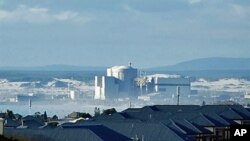South Africa is celebrating the 50th anniversary of its first nuclear reactor under the Atoms for Peace program.
The only country to have produced weapons-grade uranium and then voluntarily dismantle its weapons program to turn its resources toward medical research, the country abandoned its development of weapons of mass destruction in 1993.
Nuclear medicine produced at South Africa's Pelindaba research site — generated by the SAFARI-1, water-cooled research reactor — is used in about 10 million medical procedures in more than 60 countries every year, saving millions of lives.
President Jacob Zuma addressed guests gathered to celebrate the anniversary of the SAFARI-1 project, which has produced a range of medical isotopes used for diagnosing illnesses such as cancer and heart disease.
“This child was born when there was no peace — 1965, I was doing my second year in Robben Island," he said. "So this baby that we are celebrating was born when this country was in a very serious situation. We are celebrating today when the country is at peace with itself.”
South Africa’s apartheid government pursued a clandestine nuclear weapons program from 1974 to 1990 when the country faced violence at home, war on its borders and increasing international isolation.
It was when Pretoria abandoned its development of weapons of mass destruction in 1993 that South Africa emerged as a champion of nuclear science for peaceful means.
South Africa’s government has since pledged to build a fleet of nuclear power plants to meet a growing demand for electricity. The country is heavily dependent on coal-produced power, and the state power utility, Eskom, is in crisis due to poor maintenance and planning.
To alleviate stress on the power grid, rolling blackouts will continue in the future, curbing mining production, forcing businesses to shut doors at peak times and stifling growth in Africa’s most-industrialized economy.
The CEO of Nuclear Africa, Kelvin Kemm, says the government needs to aggressively pursue nuclear energy.
“One has to distinguish between the very short-term problem of us having very little reserve capacity right now, because of the growth that has taken place, and the longer-term planning for how your future is going to unfold," he said. "I believe that it is imminent now in the next few months that some sound decisions have to be made and will be made. For South Africa, I believe nuclear power is absolutely inevitable and essential.”
China’s Guangdong Nuclear Power Holding Corporation, Russia’s Rosatom and France’s Areva, are among the companies jostling for contracts to build new atomic power plants as part of South Africa’s $85 billion nuclear energy program that aims to add 9,600 megawatts by 2030.
Environmentalists have expressed concerns about South Africa’s ability to manage a nuclear disaster, believing renewable energy is a safer alternative.
But International Atomic Energy Agency Director General Yukiya Amano says lessons have been learned from nuclear disasters.
“Access to electricity is essential for development," he said. "The number of countries interested in nuclear power continues to grow, despite the Fukushima accident. ... Many countries see nuclear power as a stable and clean source of energy that can help mitigate the impact of climate change.”
Critics of the government nuclear energy plans say they will not solve the immediate power crisis and nuclear projects are prone to cost and time overruns.
South Africa has two nuclear reactors at the Koeberg Power Station, which produces about five percent of the country’s electricity.




